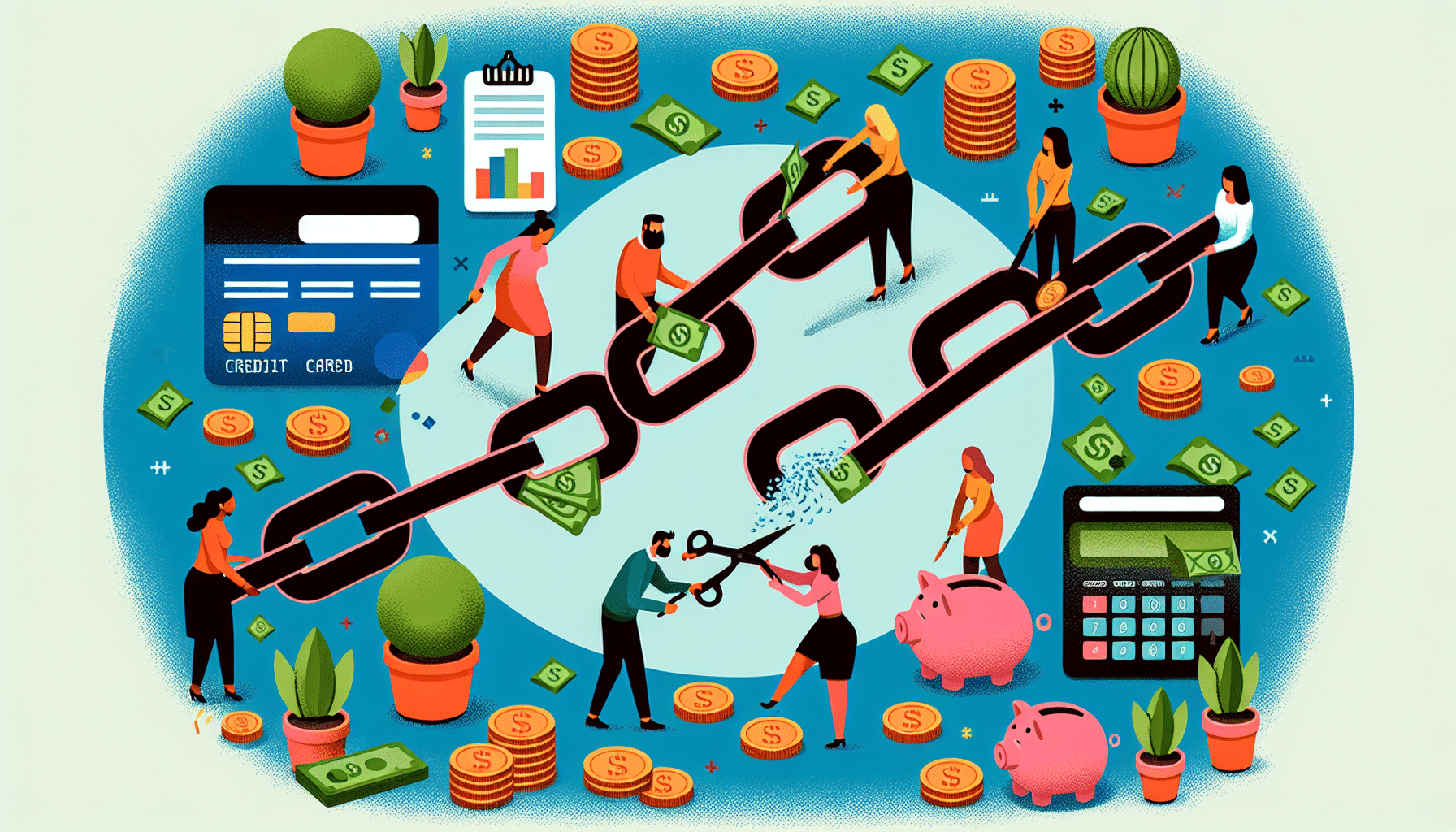If you're tired of being caught in the never-ending cycle of bad financial habits, constantly losing money, then this article is for you. It's no secret that many people have fallen into the trap of normalized behaviors that end up costing them a pretty penny. From piling up credit card debt to overspending on a regular basis, we've all been guilty of it at some point. And let's not forget the fear of investing, the lack of proper budgeting, and the assumption that we can't afford to venture into the world of stocks. But fear not, for there are solutions and alternatives to these bad habits. By using services like Fiona to consolidate credit card debt and browser extensions to find better prices when shopping online, you can start saving money and breaking the cycle. Apps like Robinhood, Stash, and websites like EverQuote can also guide you towards smarter financial decisions. So, buckle up and get ready to turn your financial life around!
Identifying Bad Financial Habits
Introduction to bad financial habits
When it comes to our finances, we all have our own set of habits. Some of these habits can contribute to our financial well-being, while others can lead to financial problems and stress. In this article, we will explore the topic of bad financial habits and how they can affect our financial health. By understanding and identifying these habits, we can take steps to break the cycle and develop better habits that will lead to long-term financial success.
Common bad financial habits
Many people have normalized bad financial habits that end up costing them money. These habits can vary from person to person, but there are certain patterns that we commonly see. Some of these habits include:
-
Having credit card debt: Credit card debt is one of the most common bad financial habits. Relying on credit cards without the means to pay off the balance each month can lead to high interest rates and a growing debt burden.
-
Spending more than we make: Living beyond our means and constantly spending more than we earn can quickly lead to financial trouble. It's important to live within our means and prioritize saving and investing for the future.
-
Being afraid to invest: Investing can be intimidating, and many people avoid it altogether out of fear or lack of knowledge. However, not investing can mean missing out on the potential for long-term financial growth and security.
-
Not budgeting properly: Without a clear budget, it's easy to overspend and lose track of where our money is going. A budget is essential for managing our finances effectively and ensuring that we're saving and spending in alignment with our financial goals.
-
Not shopping around for car insurance: Many people stick with the same car insurance provider for years without exploring other options. By not comparing rates, they may be missing out on potential savings.
-
Assuming we can't afford to invest in stocks: Investing in stocks can seem like something only for the wealthy, but it doesn't have to be. There are options available for investing with small amounts of money that can help us grow our wealth over time.
Understanding the cost of bad financial habits
It's important to understand the true cost of these bad financial habits. Credit card debt accrues high interest, meaning that we end up paying more for the items we purchased long after the initial excitement has faded. Spending more than we make can lead to a cycle of debt and financial stress. By not investing, we miss out on the potential for long-term growth and financial security. Failing to budget properly can result in wasted money and missed opportunities. Not shopping around for car insurance can mean paying more than necessary for coverage. Lastly, assuming we can't afford to invest in stocks may result in missed opportunities for wealth accumulation and financial growth.
Breaking the Cycle of Bad Financial Habits
Recognizing the need for change
The first step in breaking the cycle of bad financial habits is recognizing the need for change. It's important to acknowledge that our current habits may not be serving us well in the long run and that there is room for improvement. This recognition can be a powerful motivator for taking action and making positive changes to our financial habits.
Setting clear financial goals
Before we can break the cycle of bad financial habits, it's important to have clear financial goals in mind. These goals can serve as a roadmap and provide direction for our financial decisions. Whether it's saving for a down payment on a house, paying off debt, or building an emergency fund, having clear goals can help us stay focused and motivated.
Creating a budget
A budget is a fundamental tool for managing our finances effectively. It allows us to track our income and expenses, ensuring that we're living within our means and making progress toward our financial goals. By creating a budget, we can allocate our money wisely, prioritize saving and investing, and make informed decisions about our spending habits.
Tracking expenses
In addition to creating a budget, tracking our expenses is another crucial step in breaking the cycle of bad financial habits. By keeping a record of our purchases and expenditures, we can identify areas where we may be overspending or wasting money. This awareness can help us make more informed decisions and curb impulsive spending habits.
Reducing credit card debt
If credit card debt is one of our bad financial habits, it's important to take steps to reduce and eliminate it. This may involve developing a repayment plan, negotiating lower interest rates, or consolidating debt. By reducing credit card debt, we can free up more money for savings and investments and reduce the financial stress that comes with carrying high levels of debt.
Building an emergency fund
Having an emergency fund is a crucial part of breaking the cycle of bad financial habits. An emergency fund acts as a safety net, providing financial security in the event of unexpected expenses or income loss. By setting aside a portion of our income each month, we can gradually build an emergency fund that will protect us from financial setbacks and help us navigate through challenging times.

This image is property of images.unsplash.com.
Alternative Solutions for Bad Financial Habits
Using Fiona to consolidate credit card debt
If credit card debt is weighing you down, one alternative solution is to use a service like Fiona to consolidate your debt. Fiona is an online platform that helps you compare various loan options and find the best rates for consolidating your credit card debt. By consolidating your debt into one loan with a lower interest rate, you can save money on interest and make it easier to manage and pay off your debt.
Using browser extensions to find better prices
Another bad financial habit is not shopping around for the best prices when making online purchases. By using browser extensions like Honey or Rakuten, you can easily compare prices across different retailers and find the best deals. These extensions automatically apply coupon codes and discounts at checkout, helping you save money and develop better spending habits.
Getting started with investing using Robinhood
If you've been afraid to start investing, Robinhood is a user-friendly platform that can help you get started with small amounts of money. With Robinhood, you can buy and sell stocks, ETFs, and cryptocurrencies without paying any commissions. This makes investing more accessible and affordable, allowing you to grow your wealth over time.
Implementing the 50/30/20 budgeting method
For those struggling with budgeting, the 50/30/20 budgeting method can be an effective alternative. This method involves allocating 50% of your income to essentials like housing and bills, 30% to discretionary expenses like entertainment and dining out, and 20% to savings and investments. The 50/30/20 budget provides a clear framework for managing your money and ensures that you're saving and investing a significant portion of your income.
Comparing car insurance rates with EverQuote
If you haven't shopped around for car insurance, you may be missing out on potential savings. EverQuote is a website that allows you to compare car insurance rates from multiple providers. By comparing rates, you can find the best coverage at the most affordable price, helping you save money and develop better financial habits.
Investing in stocks with small amounts using Stash
If you assume that you can't afford to invest in stocks, platforms like Stash can prove otherwise. Stash allows you to invest in fractional shares, meaning you can buy a fraction of a stock with small amounts of money. This makes it more accessible for individuals who are just starting to invest and want to grow their wealth over time.
Changing Money Mindset and Behavior
Understanding the role of mindset in financial habits
Our mindset plays a significant role in shaping our financial habits. It's essential to understand that our thoughts and beliefs about money can influence our behavior and decision-making. By cultivating a positive money mindset and adopting healthy financial beliefs, we can develop better habits that align with our long-term financial goals.
Identifying and challenging limiting beliefs
Many of us have limiting beliefs about money, such as "I'll never be able to save enough" or "Investing is only for the wealthy." These beliefs can hold us back from making positive changes and taking control of our finances. By identifying these limiting beliefs and challenging their validity, we can break free from their constraints and develop a more empowering money mindset.
Developing healthy money habits
Developing healthy money habits is crucial for sustaining long-term financial success. This involves adopting behaviors such as saving regularly, living within our means, investing in our future, and making informed financial decisions. By consciously practicing and reinforcing these habits, they can become second nature and contribute to our overall financial well-being.
Seeking professional financial advice
If you're unsure about how to change your financial habits or achieve your goals, seeking professional financial advice can be beneficial. A financial advisor can provide guidance and expertise tailored to your specific needs and circumstances. They can help you develop a personalized financial plan, provide investment recommendations, and offer ongoing support to help you stay on track.
Accountability and support systems
Accountability and support systems can also play a crucial role in changing our financial habits. Whether it's partnering with a financial accountability buddy, joining a financial education program, or participating in online communities, having others to share our progress, challenges, and successes with can provide motivation and encouragement along the way.

This image is property of images.unsplash.com.
Overcoming Obstacles and Building Resilience
Addressing temptations and triggers
Breaking bad financial habits can be challenging, especially when faced with temptations and triggers. It's important to identify these triggers and develop strategies to overcome them. Whether it's avoiding certain stores or websites, finding healthier alternatives for coping with stress or boredom, or practicing mindful spending, addressing temptations and triggers can help us stay on track with our financial goals.
Creating a financial backup plan
Building resilience in our financial journey involves creating a backup plan for unexpected events or financial setbacks. This may include having an emergency fund, diversifying our income sources, or obtaining proper insurance coverage. By having a safety net in place, we can navigate through challenging times without derailing our progress or succumbing to bad financial habits.
Developing discipline and willpower
Breaking bad financial habits requires discipline and willpower. These skills can be developed through practice and self-awareness. Finding strategies that work for you, such as setting up automatic savings transfers, creating accountability measures, or seeking support from others, can help reinforce discipline and strengthen your willpower when it comes to making positive financial choices.
Rewarding progress and celebrating milestones
It's important to acknowledge and celebrate our progress when breaking bad financial habits. By rewarding ourselves for achieving milestones or reaching financial goals, we reinforce positive behaviors and create a sense of accomplishment. Whether it's treating yourself to a small indulgence or sharing your success with loved ones, celebrating milestones can provide the motivation to continue building positive financial habits.
Learning from setbacks and adjusting strategies
Inevitably, setbacks will occur along the journey of breaking bad financial habits. It's important to view setbacks as learning opportunities rather than reasons to give up. By reflecting on what went wrong, adjusting strategies, and seeking support or guidance when needed, we can overcome setbacks and continue making progress towards our financial goals.
Teaching Financial Literacy and Empowering Others
Promoting financial education
Financial literacy is essential for breaking the cycle of bad financial habits. By promoting financial education, we can empower others to make informed financial decisions and develop healthy habits. This can include advocating for financial education programs in schools, participating in community workshops, or sharing resources and knowledge with friends and family.
Encouraging open conversations about money
Breaking the taboo around money and encouraging open conversations is crucial for promoting financial empowerment. By discussing our financial challenges, goals, and successes openly, we create a supportive environment that allows others to feel comfortable seeking advice and support. Open conversations about money can also help challenge societal norms and beliefs that perpetuate bad financial habits.
Sharing success stories and inspiring others
Sharing success stories and personal experiences can inspire and motivate others to break their own bad financial habits. By showcasing real-life examples of individuals who have overcome financial struggles and achieved their goals, we can provide hope and encouragement to others facing similar challenges. Sharing success stories can also highlight the potential for change and empowerment in everyone's financial journey.
Supporting vulnerable communities
Financial empowerment is not equitable and may be disproportionately inaccessible to certain communities. By supporting vulnerable communities and advocating for equal access to financial resources, education, and opportunities, we can work towards a more inclusive and fair financial system. This can include volunteering with organizations that provide financial literacy programs or supporting initiatives that address financial inequality.
Advocating for policy changes
Advocating for policy changes is another way to address and prevent bad financial habits on a broader scale. By participating in advocacy campaigns or supporting organizations that work towards financial reform, we can influence policies that promote financial well-being and protect consumers' rights. Policy changes can create a more supportive environment for individuals to break bad financial habits and build lasting financial resilience.

This image is property of images.unsplash.com.
Leveraging Technology and Tools for Financial Success
Exploring personal finance apps and platforms
Technology has made managing our finances more accessible and convenient than ever before. Exploring personal finance apps and platforms can provide tools and resources to help us achieve our financial goals. Whether it's tracking expenses, creating budgets, or setting savings goals, there are numerous apps available that can simplify and streamline our financial management process.
Automating savings and investments
Automating our savings and investments is a powerful tool for building wealth and breaking bad financial habits. By setting up automatic transfers from our checking account to a separate savings or investment account, we can consistently save and invest without the need for constant manual intervention. This ensures that we prioritize saving and investing even during busy or challenging times.
Utilizing financial tracking tools
Financial tracking tools can help us stay organized and monitor our progress towards our financial goals. These tools provide insights into our income, expenses, and savings, allowing us to identify areas for improvement and make informed financial decisions. By utilizing financial tracking tools, we can gain clarity and control over our finances, breaking free from bad habits and making positive changes.
Accessing online resources and tutorials
The internet offers a wealth of resources and tutorials on personal finance. Accessing these online resources can provide valuable information and guidance on breaking bad financial habits. Whether it's reading blogs, watching educational videos, or participating in online courses, there are numerous opportunities to learn and grow our financial knowledge.
Being cautious of scams and fraudulent activities
While technology provides many benefits when it comes to managing our finances, it's essential to be cautious and vigilant of scams and fraudulent activities. Protecting our personal and financial information is crucial in maintaining our financial well-being. By staying informed about common scams, using secure platforms, and regularly monitoring our accounts, we can safeguard ourselves against potential fraudulent activities.
Developing Long-Term Financial Habits
Understanding the importance of consistency
Developing long-term financial habits requires consistency and commitment. It's important to understand that financial success is not built overnight but rather through consistent effort and dedication. By maintaining healthy financial habits and consistently taking small steps towards our goals, we can create lasting change and achieve long-term financial well-being.
Setting achievable financial milestones
Setting achievable financial milestones is crucial for maintaining motivation and measuring progress. These milestones should be realistic and specific, allowing us to track our advancement and celebrate our achievements along the way. Whether it's paying off a specific amount of debt, reaching a savings target, or increasing our investment contributions, setting achievable milestones provides a sense of direction and purpose.
Adopting a long-term mindset
Developing long-term financial habits requires adopting a long-term mindset. Instead of focusing solely on immediate gratification or short-term goals, it's important to consider the bigger picture and prioritize our long-term financial well-being. By understanding the benefits of delayed gratification and making decisions that align with our long-term goals, we can create a strong foundation for financial success.
Regularly reviewing and adjusting financial strategies
As our lives and circumstances change, it's necessary to regularly review and adjust our financial strategies. This may involve reassessing our budget, reallocating our investments, or fine-tuning our savings goals. By regularly reviewing our financial strategies, we can ensure that they remain aligned with our current needs and goals, allowing us to stay on track and adapt to changing circumstances.
Continuing to educate oneself on financial matters
Financial education is a lifelong journey. It's important to continue educating ourselves on financial matters and staying up-to-date with changes in the economic landscape. By reading books, attending seminars, listening to podcasts, or seeking advice from financial professionals, we can continually expand our financial knowledge and make informed decisions that will benefit our long-term financial well-being.

Addressing the Emotional Aspect of Financial Habits
Dealing with financial stress and anxiety
Breaking bad financial habits can be emotionally challenging, particularly when faced with financial stress and anxiety. It's important to address and manage these emotions in a healthy way. Whether it's seeking support from loved ones, practicing stress-reducing activities like meditation or exercise, or seeking professional help when needed, prioritizing our emotional well-being is crucial in breaking the cycle of bad financial habits.
Improving self-worth and money mindset
Our self-worth and perception of money can greatly influence our financial habits. By improving our self-worth and cultivating a positive money mindset, we can develop healthier financial behaviors. This can involve challenging negative self-talk, reframing our beliefs about money and success, and practicing self-compassion. By valuing ourselves and our financial well-being, we can break free from self-sabotaging habits and make positive changes.
Overcoming emotional spending
Emotional spending is a common bad financial habit that many people struggle with. When faced with difficult emotions, it's easy to turn to spending as a way to cope or seek temporary relief. Overcoming emotional spending involves developing alternative coping mechanisms, such as journaling, engaging in hobbies, or seeking emotional support. By addressing the root causes of emotional spending and finding healthier ways to manage emotions, we can break free from this damaging habit.
Seeking professional support if needed
If breaking bad financial habits feels overwhelming or unmanageable, it's important to seek professional support. Financial therapists, counselors, or coaches can provide guidance and support tailored to your specific needs. They can help you navigate through emotional barriers, develop healthier financial habits, and create a personalized plan for long-term financial success.
Embracing a positive relationship with money
Developing a positive relationship with money is essential for sustaining positive financial habits. Rather than viewing money as a source of stress or anxiety, we can choose to see it as a tool for creating the life we want. By embracing gratitude, practicing healthy financial habits, and aligning our money decisions with our values, we can cultivate a positive relationship with money that supports our long-term financial well-being.
Sustaining Positive Financial Habits and Saving Money
Creating a support network
Sustaining positive financial habits and saving money can be easier when we surround ourselves with a supportive network. This can include friends, family members, or colleagues who share similar financial goals and values. By sharing experiences, advice, and resources, we can stay motivated and accountable in our financial journey.
Regularly reviewing financial goals
To sustain positive financial habits and save money, it's important to regularly review and revisit our financial goals. This allows us to assess our progress, make any necessary adjustments, and stay focused on our long-term objectives. By keeping our goals at the forefront of our minds, we can maintain motivation and ensure that our actions align with our aspirations.
Celebrating financial achievements
Celebrating financial achievements, no matter how small, is crucial for sustaining positive financial habits. Taking the time to acknowledge and celebrate milestones, whether it's paying off debt, reaching a savings goal, or sticking to a budget, reinforces positive behaviors and keeps us motivated. By celebrating our achievements, we can foster a positive relationship with money and build momentum towards future financial success.
Continuing to educate oneself on personal finance
To sustain positive financial habits, it's important to continue educating ourselves on personal finance. This includes staying informed about new strategies, investment opportunities, and financial tools. By staying curious and continually expanding our financial knowledge, we can adapt to changing circumstances and make informed decisions that contribute to our long-term financial success.
Evaluating and adjusting financial habits over time
Financial habits may need to be evaluated and adjusted over time to ensure that they continue to align with our evolving goals and circumstances. Regularly evaluating our habits allows us to identify areas for improvement and make necessary changes. By remaining flexible and open to adjustments, we can sustain positive financial habits and continue making progress towards our financial goals.


